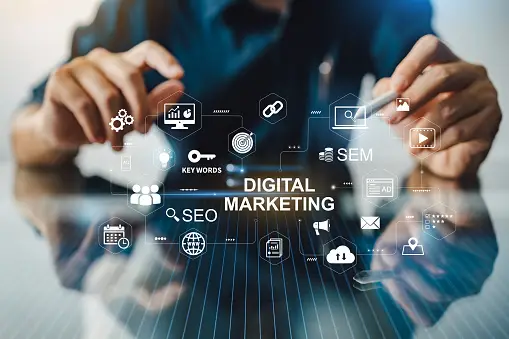In the fast-paced and ever-evolving landscape of the digital age, businesses and individuals are increasingly turning to digital marketing as a powerful means to connect with their audience, build brand presence, and drive measurable results. This comprehensive guide explores the multifaceted world of digital marketing, shedding light on its diverse strategies, components, and the pivotal role it plays in the contemporary business landscape.
Digital marketing encompasses a broad range of online strategies and tactics aimed at promoting products, services, or brands through digital channels. Unlike traditional marketing, which relies on offline methods such as print or television, digital marketing leverages the vast ecosystem of the internet to reach and engage target audiences.
Key Components of Digital Marketing:
- Search Engine Optimization (SEO):
SEO is the foundation of any successful digital marketing strategy. It involves optimizing a website’s content, structure, and backlink profile to rank higher on search engine results pages (SERPs). Effective SEO increases visibility, drives organic traffic, and establishes credibility. - Content Marketing:
Content is king in the digital realm. Content marketing involves creating and distributing valuable, relevant, and consistent content to attract and retain a clearly defined audience. Blog posts, articles, videos, infographics, and social media posts are all forms of content marketing. - Social Media Marketing:
Social media platforms provide a dynamic space for brands to connect with their audience. Social media marketing involves creating and sharing content on social media channels to build brand awareness, engage followers, and drive website traffic. Platforms like Facebook, Instagram, Twitter, and LinkedIn are popular choices. - Email Marketing:
Email marketing remains a potent tool for direct communication with a targeted audience. Through newsletters, promotional emails, and personalized campaigns, businesses can nurture leads, retain customers, and drive conversions. Effective email marketing relies on segmentation, personalization, and valuable content. - Pay-Per-Click (PPC) Advertising:
PPC advertising allows businesses to place ads on search engines and pay a fee only when the ad is clicked. Google Ads is a prominent example of PPC advertising. It provides a targeted approach to reaching potential customers based on specific keywords, demographics, and user behavior. - Affiliate Marketing:
Affiliate marketing is a performance-based strategy where businesses reward affiliates (partners) for driving traffic or sales to their website through the affiliate’s marketing efforts. This collaborative approach leverages the affiliate’s audience and marketing skills. - Influencer Marketing:
Influencer marketing involves collaborating with influencers – individuals with a significant online following – to promote products or services. Influencers can amplify brand messages, build trust, and reach specific niche audiences through their authenticity and credibility. - Analytics and Data Analysis:
Data is at the heart of digital marketing. Analytics tools provide insights into user behavior, website performance, and the success of marketing campaigns. Data analysis allows marketers to refine strategies, optimize campaigns, and make informed decisions.
The Importance of Digital Marketing:
- Global Reach:
Digital marketing transcends geographical boundaries, allowing businesses to reach a global audience. This expansive reach is particularly advantageous for small and medium-sized enterprises looking to expand their market footprint. - Cost-Effectiveness:
Compared to traditional marketing methods, digital marketing is often more cost-effective. Businesses can allocate budgets strategically, target specific demographics, and measure the return on investment (ROI) with greater precision. - Measurable Results:
Digital marketing provides real-time and measurable results. Analytics tools allow marketers to track website traffic, engagement, conversion rates, and other key performance indicators. This data-driven approach enables continuous optimization for better results. - Personalization and Targeting:
Digital marketing enables personalized and targeted communication. Through data analysis, businesses can tailor messages and content to specific audience segments, increasing the relevance of marketing efforts and enhancing the overall customer experience. - Adaptability to Trends:
The digital landscape evolves rapidly, and digital marketing allows businesses to adapt to emerging trends swiftly. Whether it’s the rise of a new social media platform, changes in search algorithms, or shifts in consumer behavior, digital marketers can adjust strategies to stay ahead.
Digital marketing is not merely a trend; it is a dynamic and indispensable force shaping the way businesses connect with their audience in the digital era. From SEO and content marketing to social media, email campaigns, and analytics, a comprehensive digital marketing strategy empowers businesses to thrive in the ever-evolving digital landscape. As technology continues to advance, businesses that harness the power of digital marketing will be better positioned to succeed, engage their audience, and achieve sustainable growth in the digital frontier.



Leave a Reply